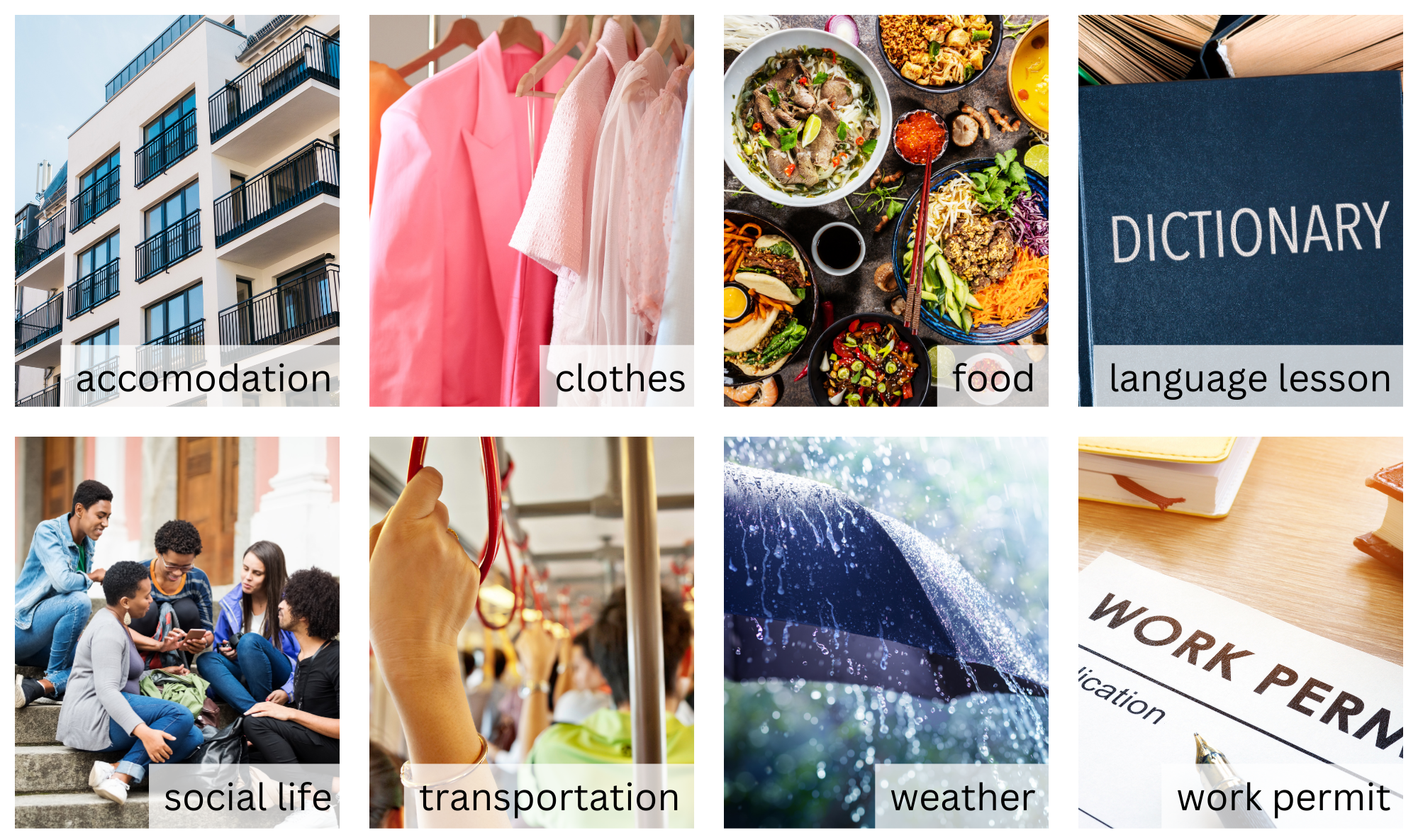Modals 2 – Lead In
A. Context Speaking
- Should newcomers learn local culture? Why?
- Is it important to adapt quickly? Why?
- Do you recommend making local friends? Why?
- Is it necessary to learn the language? Why?
- Do you suggest accepting new experiences? Why?
- Is it good to read about the place to be visited? Why?
B. Context Listening
You are going to hear a man asking a colleague for advice about living in Hong Kong. Before you listen, look at the pictures and guess which of these topics they talk about.

Listen and check if you were right.
Now listen again and fill in the gaps in the colleague’s advice.
- You ____ a few days to recover from jet lag.
- You ____ the underground system as much as possible.
- You ____ some Cantonese to travel on the public light buses.
- You ____ loose change on the ferries and the buses.
- You ____ to speak Cantonese in some market stalls.
- You ____ a work permit before you go.
- You ____ too casually for work.
- You ____ any guide books in England.
- You ____ lots of passport photos with you.
Complete the table below with words from Exercise 3.
| strong obligation or necessity | advice or suggestions | no obligation or necessity |
| need to |
Look at the conversations in Exercise 3 and answer these questions.
- Which modal verb expresses strong obligation or necessity?
- Which modal verb is used for advice or suggestions?
- Which modal verb indicates no obligation or necessity?
Show Answer Key and Audio Transcript Answer Key1 They discuss transport, languge lessons, work permits and accommodation. 3 1 ’ll need to allow 2 should try to use 3 ’ll have to learn 4 should always carry 5 ’ll need 6 have to get 7 mustn’t dress 8 needn’t buy 9 ought to take 4 – strong obligation or necessity: mustn’t, have to, TranscriptJack: Hello Claire. How much longer before you leave for Hong Kong? Claire: Hi Jack, it’s about a month now. Actually, I could use a bit of advice. You used to live there, didn’t you? Jack: That’s right. What sorts of things do you need to know? Claire: Well, I’ve got to find somewhere to live quite quickly. The company is only paying for me to stay in a hotel for one week. Will that be enough? Jack: Yes, you should be able to find something by then, but you’ll need to allow a bit of extra time to get over the jet lag; there’s a big time difference between there and the UK. Claire: Oh, I hadn’t thought of that. What’s the accommodation like? Jack: Well, the rooms tend to be smaller than here but you can get bigger places on one of the other islands. A friend of mine rented a lovely place on Lamma Island. The only problem was he had to get up really early to catch the ferry to work. Claire: What’s the transport like generally? Jack: Fantastic! The underground system is called the MTR and there are trains every couple of minutes, so you don’t have to wait for ages like we do here. You should try to use it whenever you can. The bus system is a bit more complicated because there are normal double-decker buses but there are also smaller buses called ‘public light buses’. They only stop when you ask them to, so you’ll have to learn some Cantonese if you want to take one of those. The Star Ferry is amazing. It’s so cheap and you get the best view of the harbor – you really have to see it to believe it. You should always carry plenty of loose change though for the buses and the ferries. Claire: The company has offered us Cantonese lessons when I get there. Do you think I should take them? Jack: Oh, definitely, you must have lessons if you want to be able to pronounce things correctly. You don’t need to speak Cantonese in the bigger shops but you’ll need some basic phrases when you go shopping in the local market. Claire: Is there anything else I need to know? Jack: Well, nowadays you have to get a work permit before you go. We didn’t have to worry about those when I was there. Claire: Yes, that’s already taken care of. Jack: And you mustn’t dress too casually for work. Everyone dresses really well in Hong Kong. Claire: I’ll remember that. Jack: Oh, and you needn’t buy lots of guide books before you go. You can get great ones there for a fraction of the price. Also, you ought to take lots of passport photos with you. You’ll find you need lots to fill in any application forms. Claire: Great! I’m getting pretty excited now. Jack: I’m not surprised. Oh, one last thing… Claire: What’s that? Jack: You must invite me to visit you! |